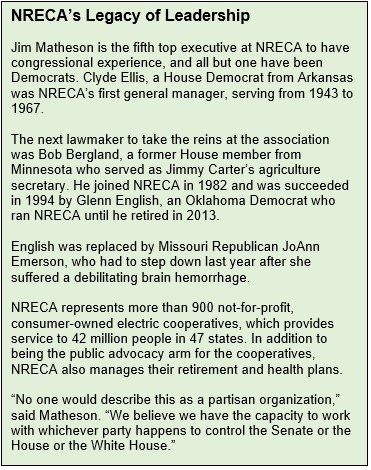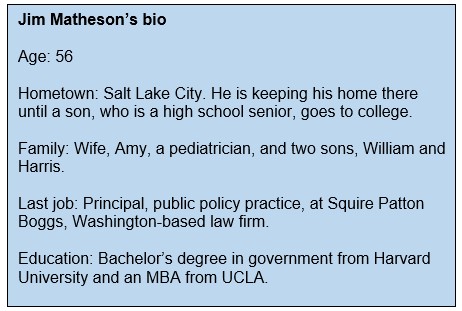WASHINGTON, Aug. 29, 2016 - Jim Matheson, a Democrat who was elected to seven terms in the U.S. House from a reliably Republican district in Utah, knows something about what it takes to work across party lines and buck political headwinds.
He’ll need that experience in his new job as CEO of the National Rural Electric Cooperative Association, which argues that the Obama administration’s climate regulations will drive up consumer costs and put some of its many coal-dependent co-ops out of business
President Obama’s Clean Power Plan is the cornerstone of the U.S. pledge to reduce greenhouse gas emissions under the Paris accord. Democratic presidential nominee Hillary Clinton has pledged to implement the regulations if she’s elected, and has called for taking additional steps to reduce carbon emissions. Donald Trump opposes the regulations.
For now, the Supreme Court has put a hold on the plan while lower courts consider a lawsuit in which NRECA is a lead plaintiff. But if the courts eventually allow the rules to take effect, the threat to co-ops is so serious that NRECA may have to go to Congress, or to the next administration, to seek some form of relief, Matheson says.
“Our argument is, ‘How are we going to have our members avoid massive economic disruptions?’ That’s where we’re coming from. I think that’s a legitimate issue and I would think anyone would want to talk to us about it, whatever they think about climate change,” he said.
The aid that NRECA would seek could come in the form of an extension of compliance deadlines or possible financial help to co-ops that are burdened with coal-fired plants that the Clean Power Plan has turned into stranded assets, Matheson says. That would almost certainly require working across party lines with a divided Congress – and a Democratic president, if Clinton is elected. Republicans are expected to retain control of the House in November, but Democrats have a good chance of taking control of the Senate.
Matheson cites his own experience in winning election in deep-red Utah as proof that he can build the kind of political coalitions that NRECA will need. He was first elected in 2001 and was re-elected six more times until he retired in 2015.
“I had to reach out and build a consensus around, in this case … electing me,” said Matheson in an interview in his 11th floor office at NRECA’s headquarters in Arlington, Virginia. A bookcase in one corner of the office holds four pairs of well-worn cowboy boots – a reminder of his Western roots – and he’s wearing a fifth pair.
With so many Republican constituents, “I had to overcome some initial predispositions that might have led them in a different direction, namely their party. I think that capacity to facilitate some level of stakeholder engagement, if you will, is what I learned during my political life,” he said
Matheson won re-election in 2008 by 28 points even as GOP presidential candidate John McCain carried Matheson’s district by 18 points.
A big part of his success was his voting record, one of the most conservative among House Democrats. In 2009, he voted against both of Obama’s chief first-term legislative initiatives, the Affordable Care Act and the cap-and-trade proposal to lower greenhouse gas emissions
Matheson’s decision to retire didn’t come until after he was put into a new district and narrowly won re-election in 2012 over Republican Mia Love, who went on to win the seat in 2014.
As for his legislative successes, he cites a measure with the parochial title of the Washington County Lands Bill. Its original aim was to free up some federal land badly needed for development and infrastructure in Utah’s fast-growing Washington County, home of Zion National Park. But the complex deal that Matheson forged in partnership with the state’s then-Republican senator, Bob Bennett, required a series of compromises with environmental groups, an Indian tribe, and a range of other interests.
The legislation that ultimately passed in 2009, after five years of negotiations, created 2 million acres of wilderness nationwide and was seen by many as a model for how to protect sensitive lands across the country.
There were 23 groups of stakeholders, including the county commissioners, who had varied interests, Matheson said. “They thought they couldn’t even talk to each other. It was hard to get (them) into the room to start with, but in the end nobody got everything they wanted but we succeeded. … They all got something.”
Matheson says he’s still familiarizing himself with the co-ops’ issues, drawing on a background in energy policy that stretches back to before he came to Washington. He worked for several different companies in the energy sector and later started an energy consulting firm.
He’s already well familiar with the climate issue, and no sector of the power industry probably has more at stake in the Clean Power Plan than the electric cooperatives. As an industry they get an estimated 58 percent of their power from coal, versus just 12 percent from natural gas, which has significantly lower carbon emissions. When the regulations were proposed, NRECA said the co-ops would raise rates on some of their consumers by as much as 33 percent in 2020 and 46 percent in 2025.
Matheson says the litigation has already bought the co-ops
some time by getting the Supreme Court stay on the rule. But, he said, “At
some point that clock is going to run out. I’m
not naive about that.
“In the interest of avoiding exposure to the taxpayer, which ultimately could happen here if you went to the most extreme case, there’s going to have to be some discussion about how we’re going to mitigate the stranded cost issue and give co-ops the appropriate and reasonable running room for whatever transitions they’ve got to take. That may be a legislative strategy, quite frankly. That’s probably the most obvious path to take. But there may be an effort to negotiate with the agency (the EPA) as well.”
Matheson says the co-ops have a powerful political weapon in the form of their 42 million consumers, who are spread out across 47 states. Political leaders should care about what that many consumers are thinking, he says.
“I would like to think that in the current political world we’re in right now, where there is a heightened degree of populism, which we’ve seen affect both political parties, by the way, a distrust of big anything, I think our position is even stronger to be a voice. And so I welcome the chance, whoever is the administration, to sit down and say, ‘Look, our motivation is we’re looking out for 42 million consumers.’
“Whether you have a state with a lot of co-ops, or with none – because there are three that have none – that consumer perspective is still of real value. I’d like to think that a Clinton administration or a Trump administration would want to hear from us.”
Matheson hasn’t talked to either of the presidential campaigns yet. He believes Clinton has an understanding of electric co-ops going back to her experience in Arkansas, where her husband was governor.
“She knows something about us. We’re not going to come in to somebody who is a stranger when we walk into the door because she’s familiar with the co-op community, and so I would like to think that puts us in a good position to come in and represent the energy industry and what I would like to think is a pretty powerful position.”
Switching to natural gas is impractical for many co-ops, in part because of the time it takes to build the necessary pipelines, he says.
“These pipelines don’t get tossed into the ground and up in
operation in a couple of months,” he said. Co-ops in Florida, for example,
already have trouble getting access to gas. There are “serious transportation
and delivery bottlenecks that are going to have to be addressed.”
#30
For more news, go to: www.Agri-Pulse.com
